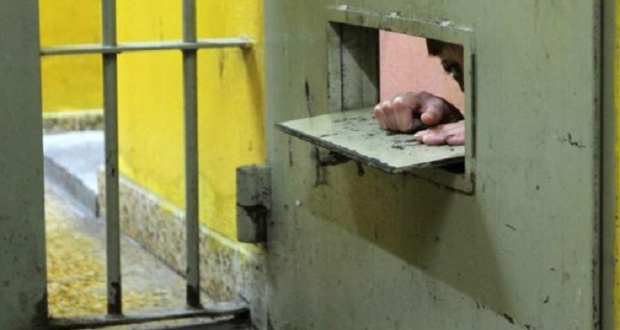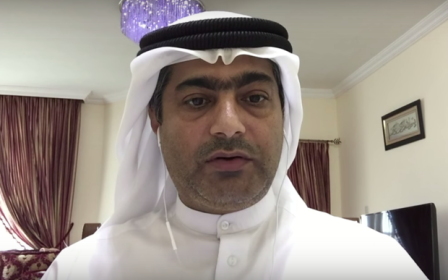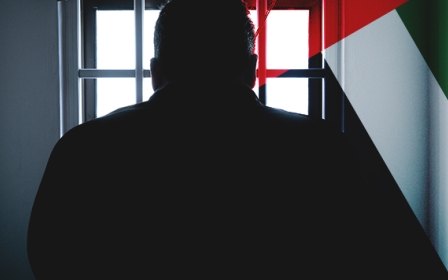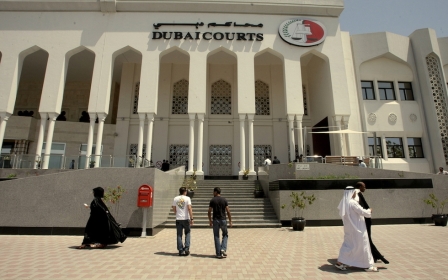Ahmed Mansoor: UAE wants the world to forget about its 'million-dollar dissident'
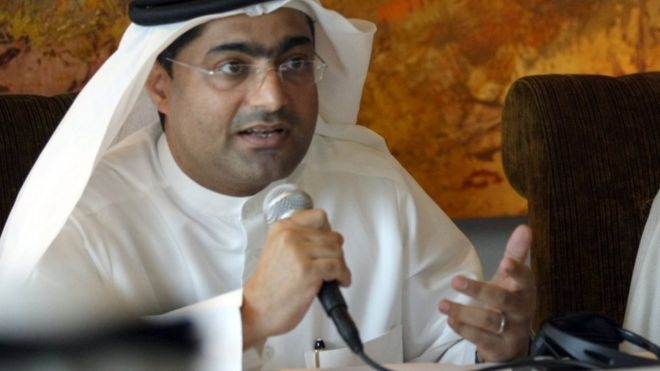
After being held arbitrarily for over a year in solitary confinement without access to a lawyer, award-winning Emirati human rights activist Ahmed Mansoor has finally been brought to trial in the UAE.
An eerie silence, however, hangs over proceedings. In typical Kafkaesque fashion, details are scant and information sketchy. It is not clear what charges he faces, which court is hearing his case, or whether he has access to legal counsel.
This state-sanctioned blackout has been pervasive throughout Mansoor's detention. On the day following his arrest in March of last year, UAE state media said that he had been detained for using his social media account to "publish false information that damages the country’s reputation" and to "spread hatred and sectarianism".
Avoiding public scrutiny
Since then, however, no official comment has been issued on his case. This is a well-worn strategy regularly undertaken by Emirati authorities when dealing with government critics.
The hope is that by extending the pretrial detention period of activists, the outside world will simply forget about cases, and subsequent trials can be conducted in silence, gaining as little public scrutiny as possible.
For example, Nasser bin Ghaith, serving a 10-year sentence for tweets, was disappeared for months before trial; Tayseer al-Najjar, sentenced to three years for cybercrimes, was held for more than a year without access to a lawyer; Mohammed al-Roken was disappeared without explanation for eight months before receiving a 10-year sentence alongside 69 other government critics in 2013. This list goes on.
As the last dissident voice in the Emirates, Mansoor had consistently proved to be a vital source of information for international NGOs looking to gain a credible assessment of the human rights situation in the country
Since Mansoor's arrest, however, this institutionalised silence has also engulfed the last vestiges of Emirati civil society. Over the last year, there has been something of an information blackout from within the country on the issue of human rights. The reasons for this are clear. Prior to his arrest last year, Mansoor was quite literally the last person openly speaking out about the topic in the UAE.
Since the Arab uprisings of 2011, state repression against government critics has been stepped up to the extent that the UAE now has one of the highest rates of political prisoners per capita anywhere in the world.
In prison or in exile
As the last dissident voice in the Emirates, Mansoor had consistently proved to be a vital source of information for international NGOs looking to gain a credible assessment of the human rights situation in the country.
He regularly provided updates on the conditions of other political prisoners in the UAE. Ominously, his last tweet on 19 March 2017 - the day before he was arrested - called for the release of Emirati rights activist Osama al-Najjar, who has now been held for more than a year past the completion of his sentence.
It is with bitter irony, therefore, that Mansoor, who has spoken up for so many detainees in the UAE, now finds himself isolated, with nobody inside the country speaking up on his behalf. Quite simply, everyone who would have done so is either in prison or in exile, worried to say anything for fear of the safety of family members back home.
Paradoxically, however, this came with risks for a PR-conscious regime eager to preserve an image of liberal tolerance on the world stage. Since briefly detaining him as part of the "UAE Five" in 2011, the government heavily harassed Mansoor, subjecting him to constant surveillance and a travel ban - but UAE authorities had always stopped short of rearresting him.
This was largely because his international prominence had risen rapidly in the years following his initial detention. With a seat on the advisory board of Human Rights Watch and the Gulf Centre for Human Rights, Mansoor had earned a credible standing within this community - so much so, that in 2015 he won the prestigious Martin Ennals Award for Human Rights Defenders, which aims to provide "protective publicity" to activists who work in dangerous countries.
An emboldened Emirati regime
His profile was to rise even further in 2016, after it was revealed that Emirati authorities had hacked his iPhone using Israeli spyware technology. The UAE government reportedly paid $1m for the software, leading international media outlets to dub Mansoor "the million-dollar dissident". Coverage was so widespread that Apple was even forced to issue a special update to guard against future similar attacks.
From the perspective of the regime, therefore, detaining such a well-known human rights advocate was a gamble that could quite easily backfire.
However, in an era of rising right-wing populism and provincial nationalism, with a Trump presidency on the one hand and a Brexit Britain eager to strike trade deals with repressive regimes on the other, the Emirati regime perhaps felt emboldened to finally go for Mansoor.
Depressingly, it is a gamble that has seemingly paid off for the regime so far. Despite UN condemnation of his continued detention, there has yet to be any substantive intervention into Mansoor’s case at an international level. In a broader sense, this is perhaps illustrative of a general cynicism at the heart of western liberal democracy when it comes to the sanctity of international humanitarian law and UN arbitration more generally.
In some respects, this has filtered down to the media. Despite his high standing within the international human rights community, Mansoor’s case has received relatively little coverage in the western press. As of yet, the "protective publicity" that ought to have protected him in such situations has not materialised.
Groundswell of grassroots activity
It seems that cases such as Mansoor’s are forgotten in the post-Arab Spring context. From the perspective of the media, the narrative that once gave their struggles a broader meaning has been lost. Tragically, therefore, viewed in isolation, struggles such as that of Mansoor run the risk of continuing in silence, at a time when the region has never been a more dangerous place for human rights activists.
Mansoor represents the hopes and aspirations of all those struggling against the weight of repressive governments across the region
This gloomy assessment, however, does not tell the whole story. Since Mansoor’s arrest last year, dozens of NGOs and public figures, including Noam Chomsky and British MP Caroline Lucas, have rallied in support of him. This has been met by a groundswell of grassroots activity.
Surprisingly, last week, it was revealed that activists in Manchester had even been lobbying their council to have a street named after him. In a city that has received billions of pounds in investments from the UAE, most notably through Manchester City FC, the "Ahmed Mansoor Street" campaign aims to raise awareness of human rights abuses in the UAE. The tables, it seems, are beginning to turn.
This level of activity must continue. UAE authorities would like nothing better than for the world to simply forget about Ahmed Mansoor and the associated calls for democratic reforms in the country.
In many respects, however, Mansoor represents the hopes and aspirations of all those struggling against the weight of repressive governments across the region. To ignore his plight would be a significant betrayal of the principles and ideals of the Arab uprisings of 2011.
On the eve of his trial, activists and governments around the world must take a stand to ensure Mansoor’s rights are respected and upheld.
- Joe Odell is press officer for the International Campaign for Freedom in the UAE. He has an MA in Middle East Politics from the School of Oriental and African Studies.
The views expressed in this article belong to the author and do not necessarily reflect the editorial policy of Middle East Eye.
Photo: Ahmed Mansoor is a prominent dissident in the UAE who won the Martin Ennals Award in 2015 (AFP)
New MEE newsletter: Jerusalem Dispatch
Sign up to get the latest insights and analysis on Israel-Palestine, alongside Turkey Unpacked and other MEE newsletters
Middle East Eye delivers independent and unrivalled coverage and analysis of the Middle East, North Africa and beyond. To learn more about republishing this content and the associated fees, please fill out this form. More about MEE can be found here.



